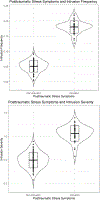Association between cardiac event-induced PTSD symptoms and daily intrusive thoughts about cardiac risk: An ecological momentary assessment study
- PMID: 38181710
- PMCID: PMC10872378
- DOI: 10.1016/j.genhosppsych.2023.11.014
Association between cardiac event-induced PTSD symptoms and daily intrusive thoughts about cardiac risk: An ecological momentary assessment study
Abstract
Objective: Posttraumatic stress symptoms (PSS) due to acute cardiac events are common and may lead patients to avoid secondary prevention behaviors. However, patients' daily experience of cardiac event-induced PSS has not been studied after a potentially traumatic cardiac hospitalization.
Method: In an observational cohort study, 108 mostly male patients with coronary heart disease were recruited after evaluation for suspected acute coronary syndrome (ACS). One month later, PSS were assessed via telephone-administered PTSD Checklist for DSM-5 (PCL-5). The exposure of interest was elevated (PCL-5 ≥ 20) vs. non-elevated PSS (PCL-5 ≤ 5). The occurrence and severity of cardiac-related intrusive thoughts were assessed 5 times daily for 2 weeks via electronic surveys on a wrist-worn device.
Results: Moderate-to-severe intrusive thoughts were experienced by 48.1% of patients but more commonly by elevated-PSS (n = 36; 66.7%) than non-elevated-PSS (n = 72; 38.9%) patients. After adjustment for demographic and clinical characteristics, elevated- vs. non-elevated-PSS patients had a 9-fold higher odds of experiencing a moderate-to-severe intrusive thought during each 2-h assessment interval (adjusted OR = 9.14, 95% CI [2.99, 27.92], p < .01). After adjustment, intrusive thoughts on a 0-to-6 point scale were over two times as intense for elevated-PSS vs. non-elevated-PSS patients.
Conclusions: Intrusive thoughts about cardiac risk were common in patients recently evaluated for ACS, but much more prevalent and intense in those with elevated vs non-elevated PSS.
Keywords: Acute coronary syndrome; Cardiovascular disease; Intrusive thoughts; Posttraumatic stress.
Copyright © 2023. Published by Elsevier Inc.
Conflict of interest statement
Declaration of competing interest The authors declare no financial or other conflicts of interest.
Figures

Similar articles
-
Posttraumatic stress disorder due to acute cardiac events and aversive cognitions towards cardiovascular medications.J Behav Med. 2018 Apr;41(2):261-268. doi: 10.1007/s10865-017-9906-3. Epub 2017 Dec 4. J Behav Med. 2018. PMID: 29204908 Free PMC article.
-
The role of perceived threat during emergency department cardiac evaluation and the age-posttraumatic stress disorder link.J Behav Med. 2018 Jun;41(3):357-363. doi: 10.1007/s10865-017-9904-5. Epub 2017 Nov 29. J Behav Med. 2018. PMID: 29188468 Free PMC article.
-
Cardiac patients' perceptions of neighboring patients' risk: influence on psychological stress in the ED and subsequent posttraumatic stress.BMC Emerg Med. 2017 Nov 6;17(1):33. doi: 10.1186/s12873-017-0144-3. BMC Emerg Med. 2017. PMID: 29110718 Free PMC article.
-
[Posttraumatic stress disorder (PTSD) as a consequence of the interaction between an individual genetic susceptibility, a traumatogenic event and a social context].Encephale. 2012 Oct;38(5):373-80. doi: 10.1016/j.encep.2011.12.003. Epub 2012 Jan 24. Encephale. 2012. PMID: 23062450 Review. French.
-
Posttraumatic stress disorder and cardiovascular disease.Prog Cardiovasc Dis. 2013 May-Jun;55(6):548-56. doi: 10.1016/j.pcad.2013.03.004. Epub 2013 Apr 6. Prog Cardiovasc Dis. 2013. PMID: 23621964 Free PMC article. Review.
Cited by
-
Red flags for depression and PTSD following acute myocardial infarction: the role of early psychological symptoms.Sci Rep. 2025 Apr 23;15(1):14033. doi: 10.1038/s41598-025-97755-0. Sci Rep. 2025. PMID: 40269141 Free PMC article.
-
Cardiac-induced PTSD symptoms predict shorter sleep a month after acute coronary syndrome evaluation.Gen Hosp Psychiatry. 2024 Jul-Aug;89:103-105. doi: 10.1016/j.genhosppsych.2024.04.003. Epub 2024 Apr 4. Gen Hosp Psychiatry. 2024. PMID: 38599946 Free PMC article. No abstract available.
-
The Role of Chronic Stress in the Pathogenesis of Ischemic Heart Disease in Women.Compr Physiol. 2025 Feb;15(1):e70000. doi: 10.1002/cph4.70000. Compr Physiol. 2025. PMID: 39903543 Free PMC article. Review.
References
-
- von Känel R, Hari R, Schmid JP, et al. Non-fatal cardiovascular outcome in patients with posttraumatic stress symptoms caused by myocardial infarction. Journal of Cardiology 2011; 58(1): 61–8. - PubMed
-
- Abbas CC, Schmid J-P, Guler E, et al. Trajectory of posttraumatic stress disorder caused by myocardial infarction: a two-year follow-up study. The International Journal of Psychiatry in Medicine 2009; 39(4): 359–76. - PubMed
Publication types
MeSH terms
Grants and funding
LinkOut - more resources
Full Text Sources
Medical

